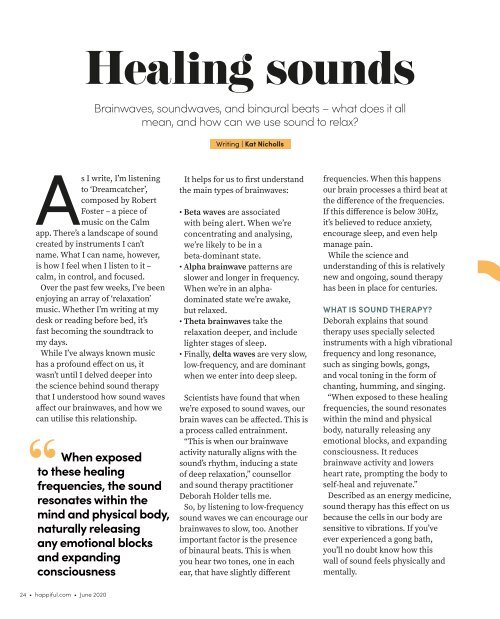Happiful June 2020
You also want an ePaper? Increase the reach of your titles
YUMPU automatically turns print PDFs into web optimized ePapers that Google loves.
Healing sounds<br />
Brainwaves, soundwaves, and binaural beats – what does it all<br />
mean, and how can we use sound to relax?<br />
Writing | Kat Nicholls<br />
As I write, I’m listening<br />
to ‘Dreamcatcher’,<br />
composed by Robert<br />
Foster – a piece of<br />
music on the Calm<br />
app. There’s a landscape of sound<br />
created by instruments I can’t<br />
name. What I can name, however,<br />
is how I feel when I listen to it –<br />
calm, in control, and focused.<br />
Over the past few weeks, I’ve been<br />
enjoying an array of ‘relaxation’<br />
music. Whether I’m writing at my<br />
desk or reading before bed, it’s<br />
fast becoming the soundtrack to<br />
my days.<br />
While I’ve always known music<br />
has a profound effect on us, it<br />
wasn’t until I delved deeper into<br />
the science behind sound therapy<br />
that I understood how sound waves<br />
affect our brainwaves, and how we<br />
can utilise this relationship.<br />
When exposed<br />
to these healing<br />
frequencies, the sound<br />
resonates within the<br />
mind and physical body,<br />
naturally releasing<br />
any emotional blocks<br />
and expanding<br />
consciousness<br />
It helps for us to first understand<br />
the main types of brainwaves:<br />
• Beta waves are associated<br />
with being alert. When we’re<br />
concentrating and analysing,<br />
we’re likely to be in a<br />
beta-dominant state.<br />
• Alpha brainwave patterns are<br />
slower and longer in frequency.<br />
When we’re in an alphadominated<br />
state we’re awake,<br />
but relaxed.<br />
• Theta brainwaves take the<br />
relaxation deeper, and include<br />
lighter stages of sleep.<br />
• Finally, delta waves are very slow,<br />
low-frequency, and are dominant<br />
when we enter into deep sleep.<br />
Scientists have found that when<br />
we’re exposed to sound waves, our<br />
brain waves can be affected. This is<br />
a process called entrainment.<br />
“This is when our brainwave<br />
activity naturally aligns with the<br />
sound’s rhythm, inducing a state<br />
of deep relaxation,” counsellor<br />
and sound therapy practitioner<br />
Deborah Holder tells me.<br />
So, by listening to low-frequency<br />
sound waves we can encourage our<br />
brainwaves to slow, too. Another<br />
important factor is the presence<br />
of binaural beats. This is when<br />
you hear two tones, one in each<br />
ear, that have slightly different<br />
frequencies. When this happens<br />
our brain processes a third beat at<br />
the difference of the frequencies.<br />
If this difference is below 30Hz,<br />
it’s believed to reduce anxiety,<br />
encourage sleep, and even help<br />
manage pain.<br />
While the science and<br />
understanding of this is relatively<br />
new and ongoing, sound therapy<br />
has been in place for centuries.<br />
WHAT IS SOUND THERAPY?<br />
Deborah explains that sound<br />
therapy uses specially selected<br />
instruments with a high vibrational<br />
frequency and long resonance,<br />
such as singing bowls, gongs,<br />
and vocal toning in the form of<br />
chanting, humming, and singing.<br />
“When exposed to these healing<br />
frequencies, the sound resonates<br />
within the mind and physical<br />
body, naturally releasing any<br />
emotional blocks, and expanding<br />
consciousness. It reduces<br />
brainwave activity and lowers<br />
heart rate, prompting the body to<br />
self-heal and rejuvenate.”<br />
Described as an energy medicine,<br />
sound therapy has this effect on us<br />
because the cells in our body are<br />
sensitive to vibrations. If you’ve<br />
ever experienced a gong bath,<br />
you’ll no doubt know how this<br />
wall of sound feels physically and<br />
mentally.<br />
24 • happiful.com • <strong>June</strong> <strong>2020</strong>

















